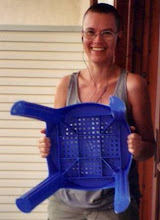Entertainment on a rainy Saturday afternoon
It's possible the England-Austria World Cup qualifier match will provide some entertainment this afternoon. It's the opening minutes of the match so too early to tell just yet. But failing all that - not that I want to put too much emphasis on the fail word - there's another sport I can recommend.
Check out the Internet Anagram Server. It's always good for a laugh. Put your friends' names in and see who comes out with the rudest alias.I've just found anagrams for Out on a dike and these are some of my favourites:
I took a nude - and why not?
Forget semantics and listen to the sounds instead. I'm still smiling about this one. To oui naked.
Talking of sounds, how about Token audio?
And leaving grammar aside, there's also Ink out a ode. I sometimes do.
So, if these anagrams can teach me anything it seems to be this. That one's best clothes are sometimes no clothes at all.



